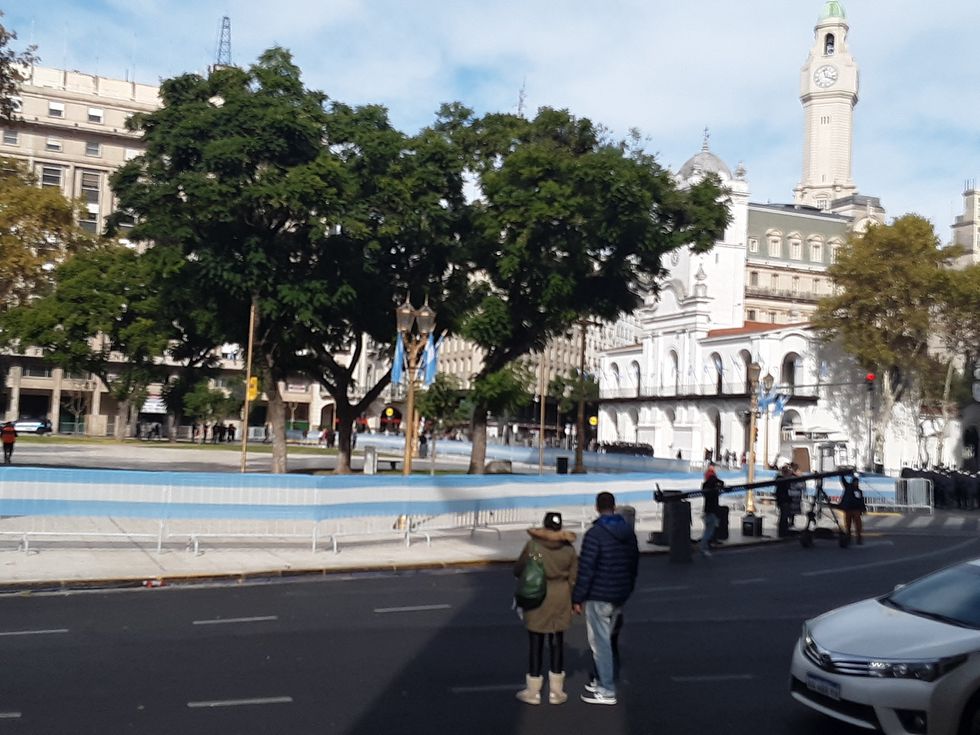I've now been in Buenos Aires studying abroad for about four months, and I have about a month left. I have, rather naturally, been constantly making connections between Argentina and the U.S. and between Buenos Aires and New York City. Being a "yanqui" outsider, I recently had as splendid of an opportunity as any outsider could possibly have to experience life in Buenos Aires: I got to participate as a choir member in the May 25th Te Deum service in the Metropolitan Cathedral with the president in attendance.
First, some background: while Argentine Independence Day on July 9th commemorates the 1816 declaration of independence from Spain, May 25th (May Revolution Day) commemorates the events of 1810 traditionally considered to have jumpstarted independence. It is because of this that every year on May 25th there is a Te Deum service in the Buenos Aires cathedral as an act of national thanksgiving, an act of offering the people ("el pueblo") to God. The Cathedral is a particularly important place because the Liberator General Don José de San Martín (in a sense the Argentine George Washington) is buried there. There is a flame perpetually burning on the facade of the Cathedral to commemorate this. The facade also reads "Salvum fac populum Tuum" ["Save Thy people"] and "Benedic hereditati Tuae" ["Bless Thine inheritance"]; this conflation between the Argentine nation as the people redeemed by San Martín and the Church as the people redeemed by Christ was perfectly manifested in how the service included both the national anthem and a traditional hymn to the Virgin of Luján, patroness of Argentina.
As a Catholic and as an Argentina-lover, the service was, to me, the greatest thing since sliced bread, both immensely fun and immensely moving. (I said goodbye to the other choir members with "¡Viva la Patria!" (equivalent to our "God Bless America") and proceeded to buy a little Argentine flag on the street, which I now have proudly displayed in my room.) I am also, however, acutely aware of the monstrous potentiality for evil in the conflation of church and state. As much as that service on Saturday the 25th was all pride and joy in the Argentine nation, that did not and does not magically erase the serious divisions among the Argentine people concerning all sorts of social and political issues. It's not for nothing that people go around the city with orange handkerchiefs to represent their desire that the church and the state be entirely separated.
I now realize that I have good grounds for comparing my school to the country I'm studying in. Fordham does not require observance of Catholicism on the part of its students and staff, yet Catholicism is definitely given a privileged place in the life of the University. Our president is a priest, Health Services has a policy of not distributing contraceptives, the graduation ceremony is accompanied by a Mass, and, if I am not mistaken, diplomas begin (in Latin) with the words "In the name of the Lord". A good amount of students at Fordham, to my mind, have no strong views about the University having a non-imposed-yet-official religion, and, of course, there are some strong Catholic students who love that model for their school. It is true, however, that there are a good amount of students who vigorously reject the University's Catholic identity, at least insofar as they consider it oppressive when it comes to their personal behavior.
Argentina, where there is freedom of religion but the Catholic Church is accorded a privileged position of recognition in the Constitution, is rather analogous. Certainly, everyone in the Cathedral's Choir was, like me, delighted to offer the nation to God in that Te Deum; certainly, the special security measures which were taken in Plaza de Mayo that day had to do with the serious discontent of certain Argentines.
What is the significance of all of this? Well, I certainly do not know what the next 25 years will look like for Argentina. I do think that I can venture to say, however, that the Te Deum I participated in, whatever problems people attach to its religious message, did indeed encapsulate the spirit of national unity that Argentina needs in its present and its future. Just as we in the U.S. can vigorously celebrate the 4th of July while recognizing that the Founding Fathers' collaboration with the invasion of native lands is something that helped to construct what it is to be American and that that is something problematic, Argentines can celebrate the nation in their Cathedral while not pretending that an identification of Argentine-ness with Catholicity has not and does not still continue to provoke serious disputes with serious consequences.
At the Fordham Commencement ceremony, I've twice sung the Alma Mater with the University's president in attendance. I've now sung the Argentine National Anthem with the Argentine president in attendance. That is, I won't deny, pretty darn cool.






















